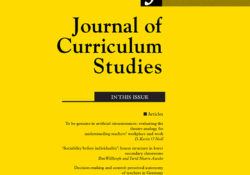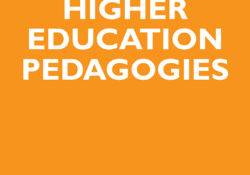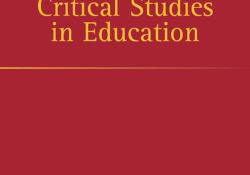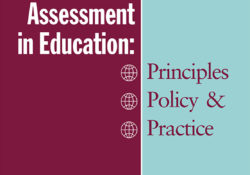tandfonline.com har udgivet en rapport under søgningen “Teacher Education Mathematics”: ABSTRACT ABSTRACT This article aims to highlight how a scientific and critical approach is used in assessment dialogues during the last period of a practical, school-based teacher education programme. The result is based on 13 assessment dialogues conducted in a course at a Swedish university, where one of the course objectives is to, ‘in a scientific way, analyse teaching situations based on learning theories’. The assessment dialogues were analysed drawing from Bernstein’s concepts of ‘classification’, ‘framing’, ‘horizontal knowledge’ and ‘vertical knowledge’. The result shows that only in a minority of the assessment dialogues are students expected to use theory as an analytical tool and to critically examine their teaching practice. The theory is used in a more instrumental way to… Continue Reading →
Like this:
Like Loading...
tandfonline.com har udgivet en rapport under søgningen “Teacher Education Mathematics”: ABSTRACT ABSTRACT Life cycle assessment (LCA) is a method of assessing the environmental impacts of the manufacture and use of a product or provision of a service such as waste management. LCAs are based on quantitative science, but softer skills are also required in interpreting the results. Therefore, LCA provides an ideal opportunity for students to develop and apply both quantitative and qualitative skills in order to address complex real-world problems. In this research a simplified spreadsheet LCA tool was produced for students to assess the environmental impacts of a waste management system. Detailed feedback from face to face and distance-learning students were positive about the tool, with students welcoming the detail provided in the results and the use of… Continue Reading →
Like this:
Like Loading...
tandfonline.com har udgivet en rapport under søgningen “Teacher Education Mathematics”: Development of a predictive tool for rapid assessment of soil total nitrogen in wheat-corn double cropping system with hyperspectral data Link til kilde
Like this:
Like Loading...
tandfonline.com har udgivet en rapport under søgningen “Teacher Education Mathematics”: ABSTRACT ABSTRACT Amid this global landscape for education and policy, this paper focuses on the subject of teacher quality through the lens of teacher education reform and one particular Australian policy initiative: The Literacy and Numeracy Test for Initial Teacher Education (LANTITE). Introduced by the federal Australian government in 2016 as a gate-keeping mechanism for students entering teacher education, we apply a four-dimensional framework to analyse LANTITE’s role as a reform measure aimed at improving teacher education, and its impact on shaping understandings of ‘teacher quality’ and ‘quality teacher education’ in relation to the broader field. Link til kilde
Like this:
Like Loading...
eric.ed.gov har udgivet: Science education reform standards have shifted focus from exploration and experimentation to evidence-based explanation and argumentation to prepare students with knowledge for a changing workforce and critical thinking skills to evaluate issues requiring increasing scientific literacy. However, in urban schools serving poor, diverse populations, where the priority is on students’ assessment results in reading and math, students may not receive reform-based science. The rationale for this qualitative study was to examine how two elementary teachers from high-poverty urban schools planned for reform-based science in response to a quality state science assessment in conjunction with their training and resources. Their state assessment included an inquiry task requiring students to construct responses to questions based on their investigation data. From evaluating evidence using Zembal-Saul’s continuum for teaching science as… Continue Reading →
Like this:
Like Loading...
eric.ed.gov har udgivet: In an effort to identify and incorporate exemplary practices into existing and future afterschool programs, the U.S. Department of Education commissioned a large-scale evaluation of the 21st Century Community Learning Center (CCLC) program. The purpose of this evaluation project was to develop resources and professional development that addresses issues relating to the establishment and sustainability of afterschool programs. Fifty-three high functioning programs representative across eight regional divisions of the nation, including rural and urban programs, community-based and school district related programs, were identified using rigorous methods. Exemplary practices in program organization, program structure, and especially in content delivery were studied. The findings were synthesized into the Afterschool Toolkit that was made available to programs nationwide via the world-wide-web. Professional development was conducted consistently and extensively throughout the… Continue Reading →
Like this:
Like Loading...

tandfonline.com har udgivet en rapport under søgningen “Teacher Education Mathematics”: ABSTRACT ABSTRACT Providing differentiated instruction (DI) is considered an important but complex teaching skill which many teachers have not mastered and feel unprepared for. In order to design professional development activities, a thorough description of DI is required. The international literature on assessing teachers’ differentiation qualities describes the use of various instruments, ranging from self-reports to observation schemes and from perceived-difficulty instruments to student questionnaires. We question whether these instruments truly capture the complexity of differentiation. In order to depict this complexity, a cognitive task analysis (CTA) of the differentiation skill was performed. The resulting differentiation skill hierarchy is presented here, together with the knowledge required for differentiation, and the factors influencing its complexity. Based on the insights of this… Continue Reading →
Like this:
Like Loading...
tandfonline.com har udgivet en rapport under søgningen “Teacher Education Mathematics”: Link til kilde
Like this:
Like Loading...
tandfonline.com har udgivet en rapport under søgningen “Teacher Education Mathematics”: ABSTRACT ABSTRACT The traditional exam has a strong holding within Norwegian higher education and is very often the preferred way of assessing students. Digital technology opens up for alternatives to the traditional exam, but so far focus has predominantly been on exchanging pen and paper with personal computers within the traditional framework. Digital alternatives may come in conflict with existing law governing teaching and assessment at university, as the law was written at a time when digital technology did not exist. We present data from a workshop in which 48 individuals from 11 institutions, academics as well as administration, were asked to identify and discuss challenges related to the introduction of digital alternatives. A case study strategy was considered appropriate… Continue Reading →
Like this:
Like Loading...
tandfonline.com har udgivet en rapport under søgningen “Teacher Education Mathematics”: ABSTRACT ABSTRACT We wanted to assess the quality of research conducted by Dutch secondary education teachers. We therefore needed to investigate the criteria for evaluating teacher research. The research timeline of this study covered four school years. We analyzed research reports and evaluation forms. We found that five quality criteria are useful for assessing teacher research. We made concrete operationalizations of these five criteria and their indicators. We found that successfully conducted teacher research contributes to professional and school development. Its contribution to professional development is greater and more concrete than to school development. Link til kilde
Like this:
Like Loading...







